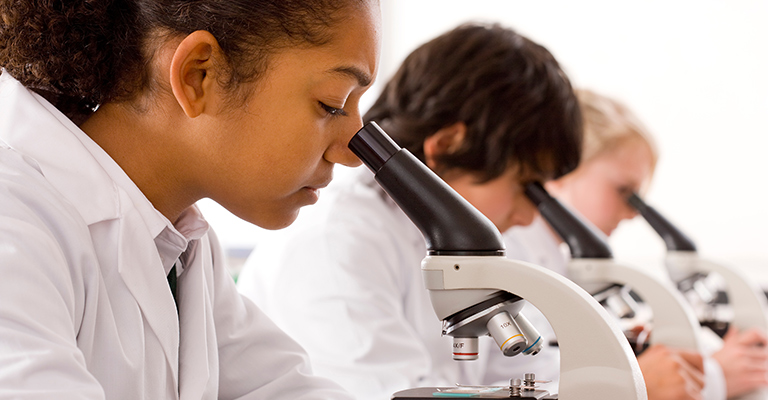“Young people need to be able to make the right choices,” explains Dr Lynne Bianchi, the Principal Investigator of a new report on children’s learning in primary science.
“And they can only do this if they have positive experiences of STEM from the outset.”
Entitled The 10 Key Issues with Children’s Learning in Primary Science in England, the report is a collaboration between The University of Manchester and The Ogden Trust. So salient are its recommendations that the report has already been cited by OFSTED, which endorses many of the findings in its own Research Review on Science.
Dr Bianchi recently appeared on The Hub to challenge gender stereotypes in primary science education, and here she explains how the new report – co-authored with Christina Whittaker of Science Across the City and Amanda Poole of The Ogden Trust – can help improve science learning for all primary-age children.
Children who may, one day, go on to study science or engineering subjects at university…

Starting early
“Influencing science learning in the primary age phase could sometimes seem a long way away from undergraduate study; however we embrace the challenge of widening access and participation in STEM, which must start from the early years,” says Dr Bianchi, who is the Director of Manchester’s Science and Engineering Education Research and Innovation Hub, and has more than 20 years’ experience in primary science education research, curriculum and teacher professional development.
“By developing a rich understanding and quality of science learning from the primary phase, and developing teacher confidence within it, the University endorses the vision and importance for world-class science teaching at pre-16.
“It’s just too late to expect we can change attitudes in the teenage years – we have to enhance and develop children’s interest and identity with STEM from the start. If we get this right, we’ll see children, teachers and their families having much improved appreciation of the range and diversity of pathways that they can pursue across the STEM disciplines.”
Ten key issues
As the title suggests, the report highlights ten key concerns affecting a child’s experience when learning science in mainstream schools in England. They are that children’s:
- science learning is superficial and lacks depth;
- preconceptions aren’t adequately valued;
- science learning lacks challenge.
And that children:
- are over-reliant on teacher talk and direction, and lack autonomy and independence in learning science;
- experience ‘fun’ science activities that fail to deepen or develop new learning;
- are not encouraged to use their own curiosity, scientific interests and questions in their science learning;
- are engaged in prescriptive practical work that lacks purpose;
- do not draw on their learning from prior scientific skills, and do not build on repeated and regular experiences;
- rarely see themselves, their families, community members or their teachers as scientists;
- do not apply literacy and numeracy skills in science at the standard they use in English and Mathematics.
The report in its entirety can be downloaded for free.

Meaningful development
“The findings are important because primary science has assumed much lower priority in primary schools over the past years,” Dr Bianchi continues. “There are many reasons for this, and often too much time is spent on looking at how this has come about.
“We have launched the report to look forward and to work with system leaders to adapt the practice in school so that more children get better experiences of science going forward.”
She adds: “The report has already gained interest across the sector, being cited by OFSTED – which focuses in particular on the fact that children are experiencing ‘fun’ science activities that fail to deepen or develop new learning.
“Of course enjoyment of a subject is vital, however this should be approached in a meaningful way so that children learn more about an area of study, and have their preconceptions and understandings developed.”
Looking to the future
So, what happens next?
Dr Bianchi explains that a follow-up study in collaboration with The Ogden Trust is now underway, which aims to provide a constructive response to the report. “By working with science subject leaders and enabling them to professionally reflect on their practice and take action against these issues, we will offer direct support to head teachers – to use the report in ways to enhance school science improvement.
“For primary science learning to be the best it can be we must work towards experiences being focused, meaningful, engaging and relevant to children. There is good practice happening in schools, although not in enough of them.”
Let’s hope the new report can help bridge the gap.
Words: Joe Shervin
Images: Shutterstock
Be sure to subscribe on our homepage to keep up to date with all the latest posts from The Hub.
